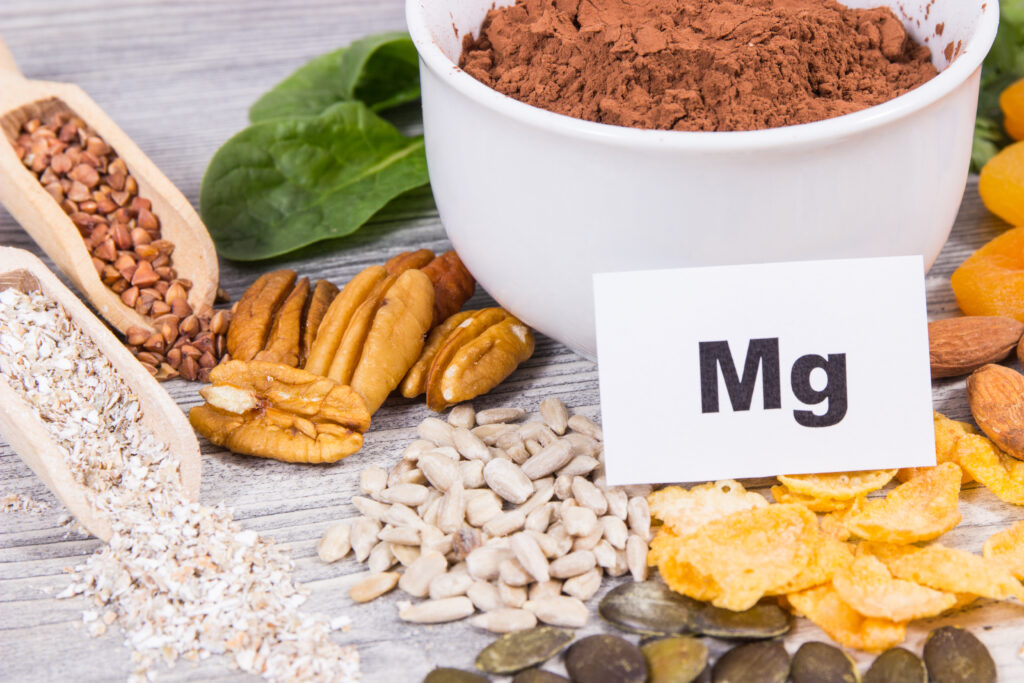Over the last century, magnesium has been progressively declining in our food supply due to the emergence of highly processed foods, modern fertilizers, and soil depletion. Refining grains removes up to 80% of the magnesium initially present. Consumption of refined sugars, soft drinks, and caffeine also depletes magnesium. It is estimated that approximately 50% of Americans of all ages have an inadequate intake of magnesium. Symptoms of magnesium deficiency include irritability and difficulty with concentration, such as ADHD, insomnia, depression, and anxiety. Magnesium deficiency is often associated with low-grade inflammation and/or pathological conditions for which inflammatory stress is considered a risk factor.
Magnesium and Brain Health
Magnesium is an inorganic substance essential for brain function. The bioavailability of magnesium affects the function and binding of neurotransmitters, such as serotonin and dopamine, to their receptors.
Assessing Magnesium Status and Bone Health
One systematic review study showed that a higher magnesium intake might support increased hip and femoral neck bone mineral density in older adults. Combining several bone nutrients (calcium, vitamin D, protein, magnesium, and potentially more) is needed to optimize bone health. Current evidence shows calcium and vitamin D are essential nutrients for preventing bone loss.
Magnesium Status and Your Brain and Heart
Higher levels of circulating Mg are associated with a lower risk of CVD, mainly ischemic heart disease and coronary heart disease. Mg supplementation prevents fractures, significantly increasing bone density in 71% of women, and stops bone loss in 16% of Biometals. 2021
Mg supplementation has been linked to improvements in symptoms of major depression, & premenstrual symptoms, postpartum depression, and chronic fatigue syndrome
Mg supplementation reduces disease severity and joint damage and increases T cell subsets known to suppress autoimmune responses.
Forms of Magnesium in Supplements
Several forms of magnesium supplementation include magnesium glycinate, magnesium oxide, magnesium citrate, and magnesium gluconate. They are equally effective, except for magnesium oxide, which is poorly absorbed and can cause laxative effects. A common side effect of magnesium supplementation is loose stools, but this symptom is usually self-limiting and self-resolving.
Adequate magnesium intake is set at 350 mg/day for adult men and 300 mg/day for adult women. Also, it is recommended to have a calcium intake of 1000 mg and take vitamin D 800 IU cholecalciferol for Bone Health.
Another consideration is being a good friend; vitamin D works synergistically with these same nutrients, allowing the body to properly use magnesium, vitamin K, calcium, zinc, and selenium for protective benefits.
Correcting trace mineral imbalances of copper and zinc is essential. Zinc is involved in numerous aspects of cellular metabolism. It plays a role in immune function, wound healing, protein synthesis, DNA synthesis, and cell division. Zinc possesses antioxidant properties, which may protect against accelerated aging and help speed up the healing process after an injury. While Copper plays an essential role in our metabolism, copper is necessary for maintaining the strength of the skin, blood vessels, and epithelial and connective tissue throughout the body. As an antioxidant, Copper scavenges or neutralizes free radicals and may reduce or help prevent some of the damage they cause. When copper acts as a pro-oxidant, it sometimes promotes free radical damage. Both copper and zinc need a balance. Different diseases can be prevented when supplements are taken.
Consumption of a well-balanced diet is vital for population-based primary prevention of chronic diseases.
References
Bleizgys, A. (2024). Zinc, Magnesium and Vitamin K Supplementation in Vitamin D Deficiency: Pathophysiological Background and Implications for Clinical Practice. Nutrients, 16(6), 834.
Osredkar, J., & Sustar, N. (2011). Copper and zinc, biological role and significance of copper/zinc imbalance. J Clinic Toxicol s, 3(2161), 0495.



